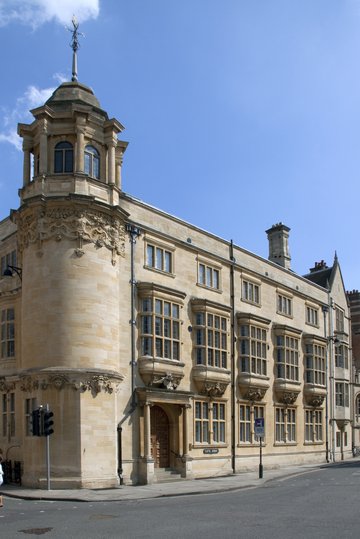
Indian Institute
Oxford centre initially designed for training Indian Civil Servants
Location(s)
OX1 3BD
United Kingdom
About
In 1875 the Boden Professor of Sanskrit at the University of Oxford, Monier Monier-Williams, put to Congregation the proposal to found an Indian Institute in Oxford. This Institute would provide a centre for study for Indian Civil Service (ICS) probationers and Indian students with a comprehensive collection of books and newspapers, and would house a museum of Indian objects. In 1875 and 1876 Monier-Williams travelled to India to secure support, items and money for the Indian Institute. Benjamin Jowett was particularly supportive of the Indian Institute. Though there had been plans to house the Institute as part of Balliol College, it was deemed prudent to make it a university institution. With debates over where to house the Institute, it was initially located in rooms on Broad Street, opposite Balliol College, until the foundation stone was laid by the Prince of Wales on 2 May 1883. The site for the Institute was on the corner of Broad Street and Holywell Street, next to Hertford College on Catte Street. An opening ceremony took place on 14 October 1884. Subscriptions for the Institute had come from Queen Victoria, the Prince of Wales and a number of Indian princes.
The building work took a further thirteen years to complete and the Institute was opened in 1896 by Lord George Hamilton, Secretary of State for India. The museum component of the Institute was perhaps the most difficult to incorporate into the vision of the building, with a number of stuffed animals that decayed and were destroyed. The Ashmolean Museum took the various fine art objects in the collection, and then the library came under the control of the Bodleian in 1927. The Institute was beset by financial difficulties and a lack of continuity in its librarians in its early years. The academic programme stagnated, with a strong focus on the ICS and a decline in interest in Sanskrit. Indian students began to see it as an ICS enclave. In 1909 Lord Curzon, Chancellor of the University, observed how the Institute was falling into disuse; by the 1930s the decline was more apparent despite the efforts of Lord Lothian, Secretary of the Rhodes Trust, to revive the Institute. Lord Lothian suggested that Edward Thompson use the Indian Institute as a base to revitalize Indian studies at Oxford and initiate prizes and fellowships for Indians, but Thompson believed the Indian Institute was beyond redemption. Although the library was popular and extremely well-stocked, there were not enough students enrolled in Indian studies to give the Institute a sense of purpose.
ICS probationers ceased to go to Oxford from 1939. ICS courses ended just before India's independence in 1947. In 1965 the University Council proposed to house their administrative offices in the building and move the Indian Institute's holdings to the Bodleian. These proposals caused a great deal of controversy and vocal opposition from those within the university and from India. However, eventually the Indian Institute Library was relocated in the roof of the New Bodleian Library in 1968. The university took over the Indian Institute building for their administrative offices but later decided to move them elsewhere. The building was then used to house the Modern History Faculty and its library. It has since become the Centre for Twenty-First Century Studies.
Benjamin Jowett, Shyamaji Krishnavarma (Monier-Williams' assistant at the time of the foundation of the Institute), Max Müller (Monier-Williams' rival and opposer of the Institute), Sir Bhagvat Sinhjee, Thakur of Gondal (helped finance the renewal of the lease in 1892), Edward Thompson (Bengali lecturer at Oxford in the 1930s who believed the Institute was too rundown to save).
A Record of the Establishment of the Indian Institute in the University of Oxford: Being an Account of the Circumstances which led to its Foundation (Oxford: Compiled for the Subscribers to the Indian Institute Fund, 1897)
Symonds, Richard, Oxford and Empire: The Last Lost Cause? (New York: St Martins Press, 1986)
Indian Institute Archives, Bodleian Library, Oxford
Evison, Gillian, 'The Orientalist, His Institute and the Empire: The Rise and Subsequent Decline of Oxford University's Indian Institute', unpublished paper, December 2004
Monier Monier Williams,'Notes of a long life's journey', unpublished memoir, Indian Institute Library, Oxford
Oxford Chronicle and Berks and Bucks Gazette, 5 May 1883
Pictures, Oxfordshire County Council
Oxfordshire History Page: http://www.headington.org.uk/oxon/broad/buildings/east/old_indian_institute/index.htm
The Times
Image credit
Photo by Tony Hisgett, 2011, Flickr, https://creativecommons.org/licenses/by/2.0/
